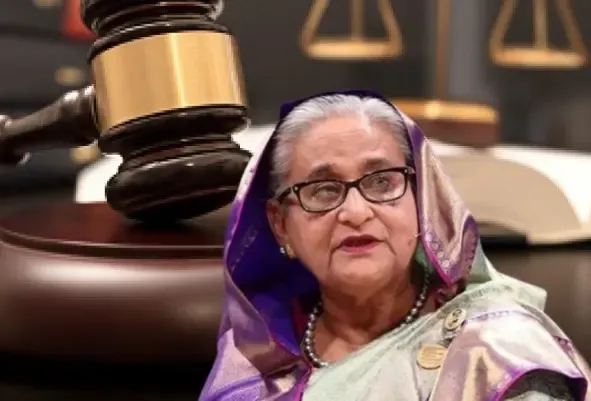What Did the Bangladesh ICT Convict Sheikh Hasina For?

Synopsis
Key Takeaways
- Sheikh Hasina and aides convicted of crimes against humanity.
- The ruling relates to protests from July of last year.
- Prosecutors seek death penalty and asset confiscation.
- Security measures have intensified in Dhaka.
- Political unrest may escalate following the verdict.
Dhaka, Nov 17 (NationPress) The International Crimes Tribunal (ICT) of Bangladesh has found former Prime Minister Sheikh Hasina and two of her senior aides guilty of crimes against humanity in relation to the protests that occurred in July last year.
The sentencing for the ousted leader is pending as the court continues to announce its verdict.
The co-accused include Asaduzzaman Khan Kamal, the former Home Minister, and Chowdhury Abdullah Al-Mamun, the former Inspector General of Police.
The proceedings were broadcast live by Bangladesh Television (BTV) from the ICT courtroom, where the three-member Tribunal-1, led by Justice Md Golam Mortuza Majumder, rendered the judgment.
To date, Hasina has disregarded the court orders, choosing not to return to Bangladesh to face trial. Asaduzzaman is a fugitive, while Mamun, currently in custody, has admitted guilt.
Notably, Mamun is the first accused since the tribunal's inception in 2010 to become a state witness.
The formal charges consist of 8,747 pages, detailing references, seized evidence, and a comprehensive victim list, as reported by the leading Bangladeshi daily, The Dhaka Tribune.
Prosecutors have indicted the defendants on five counts, including negligence in preventing murder, which is classified as a crime against humanity under Bangladeshi law. They are pursuing the death penalty pending a guilty verdict.
Furthermore, the prosecution has petitioned the tribunal to seize the assets of the three defendants upon conviction and allocate them to the victims' families.
Despite the charges, Hasina continues to deny all allegations against her.
Simultaneously, Dhaka is under an extraordinary security lockdown following a 'shoot-at-sight order' issued by Dhaka Metropolitan Police (DMP) Commissioner Sheikh Md Sajjat Ali targeting individuals involved in arson and other violent acts ahead of the ICT ruling.
A two-day strike organized by Hasina's Awami League on November 16-17 has coincided with a surge in arson incidents and cocktail explosions across the capital.
At least 21 leaders and members of the Awami League, currently barred from political activities, have been detained during operations in Narayanganj over the past 36 hours, according to The Daily Star.









